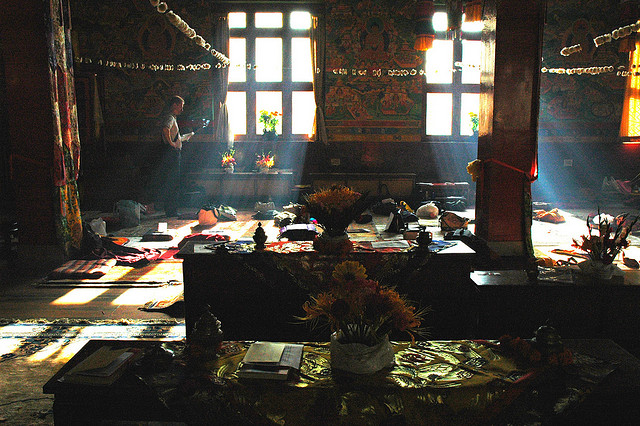It’s been on my mind a lot, lately, the idea of Buddhism. But I resist it because it’s an -ism. Or, rather, I considered it an ism until very recently.

In general, rejecting the movement of nouns into verbs is not a discussion that I will have. Nouns are nouns and verbs are verbs and never the twain shall meet. The most infamous example is diarise; a pet-hate of mine. (I’m sad to say I first learned of its use by friends whose children’s English teachers were using it. Sigh.)
Yet, the movement of the idea of Buddhism as a noun – and an Ism Noun no less! – to Buddhism as a verb is barely a stretch at all.
The idea was put forward by Stephen Batchelor, a secular Buddhist teacher, in this podcast: Cultivating a democracy of the imagination. If you’re not familiar with precepts of Buddhism, you’ll struggle with it, just a warning.
Batchelor says,
Buddhism is not something we learn to believe, but something we learn how to do.
In this framework, the Four Noble Truths are merely Tasks; and those Four Noble Tasks are part of a process that belongs to the project of Self. He goes further, into artwork, and argues that Buddhism is an artform that one practices, not a dogma in which one believes.
If your reality is strictly or militarily ReligiousAtheist (yes, one word, because dogmatic atheists treat their non-religion as a religion too), then probably you’re struggling with the idea.
But if you’ve ever studied any Buddhist methodology, texts, or teachings, then right about now you’ll be intrigued. In fact, Buddhism is not really a religion. It has no gods, it speaks of laws of existence, Buddha’s writings ask followers of Buddhism not to follow without question. The entire process of Buddhism is one of questioning, exploring, and, with a bit of luck, understanding. Wisdom is only gained by questioning reality.
The four Noble Truths Tasks of Buddhism are to understand the nature of suffering and why you cling to things that make you unhappy; to understand that change is constant; to understand that nothing is permanent; the understanding that everything exists only because it is dependent on something else.
And then the Eightfold Path tells us to see the world properly, to govern our thoughts, speech and actions; to they are the right livelihood, the right effort, mindfulness and concentration. They’re interlinked and basically translated mean, think nice things, don’t say shitty things to other people, be kind and compassionate to others; put effort into being good, be mindful about your life and concentrate and focus.
Every person’s ultimate goal is happiness, and happiness is only the absence of suffering. Your inflicting more suffering on other people, given everyone has his or her own demons, is pretty well unforgiveable. And good luck to you in all your future karmas.
But when you finally understand that everything is dependent on everything else, the interconnectedness of things really starts to ram itself home to you.
Let’s take, I dunno, a notebook. That notebook exists because it was made by a manufacturer. The parts exist because they were made by other manufacturers. Each of those businesses exists because people buy their products, and make their products. The paper exists because of trees, and trees exist because they were planted and grew with water and the sun, and so on. The metal in the binding exists because someone dug some rocks out of the ground, other people, refined the ore, still other people created wire from steel. The plastics exist because someone took oil out of the ground, and ….. etc.
Your Self is the only thing that could be considered independent, right? You are independent? Well, you’re not. Your Self wouldn’t be here if your body did not exist, and your body would not exist if love did not exist – because love and compassion and kindness makes humans thrive where absence causes them to fail. Therefore, you are dependent on other people not just for your existence but for your ability to grow and heal.
Things arise because they are dependent on other things. And now you’ll look at a homeless guy in a different way, understanding how awful it is when you have no human touch or human compassion.
Brutal, isn’t it?
When you think about the process of Buddhism, of doing Buddhist, it’s hidden. It’s a lot of learning and reading and contemplating. You learn more about life through quiet reflection than you do by being a big loudmouth in the world. Meditating is a lot about learning to be one with yourself and your body, noting what is there and questioning why it is so.
If, in your meditation practice, you start a process of generic mental noting, you can then stop yourself from being attached to how you feel, and from that position start examining yourself more closely. If your mental noting goes breathing, listening, listening, breathing, self-conscious, irritated, breathing, self-conscious, listening, self-conscious then something is going on with why you’re feeling self-conscious. You need to spend time with it and watch yourself from a non-attached state, and start moving beyond it.
As a person, I resist the idea of isms full-stop. It would mostly move my learnings forward a lot faster if I had a guru but I am not a Buddhist.
Do I even Buddhist, bro? I guess so. Gradually I’m realising that I do. It doesn’t mean that that is what I am.

3 thoughts on “Do you even Buddhist, Bro?”